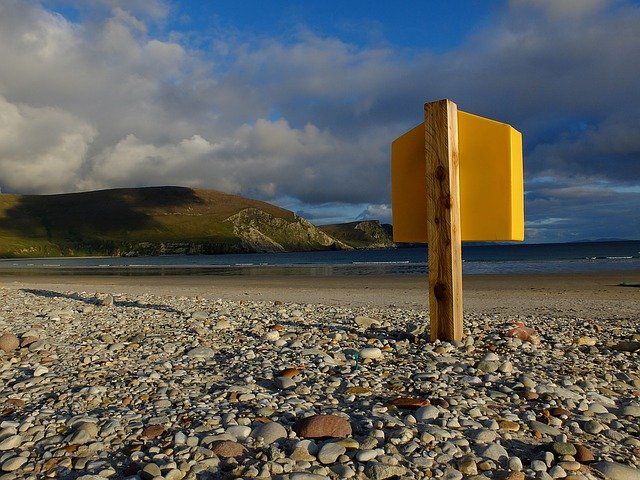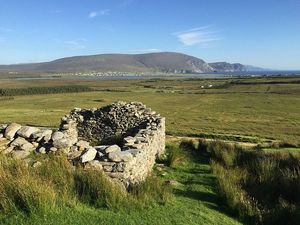In earlier articles we visited Lutterworth, Prague and Leicester to learn more of the work of John Wycliffe and the Lollards. This time we recall a movement of the Spirit in the west of Ireland in the nineteenth century. The focal point was Achill Island in Co. Mayo, which many visit for the scenery and the fishing, but was then the scene of a remarkable spiritual awakening which came to be known as the Second Reformation. My wife and I spent our honeymoon there fifty years back, when it was a delight to visit the church in the tiny village of Dugort where Edward Nangle preached with power.
Lack of concern
The Church of Ireland, sister church to the Church of England, was a key factor but was not alone in the awakening. In England, the Baptist Missionary Society not only sent William Carey to India but also directed its missionary zeal nearer home. In 1814 the Baptist Irish Society was formed. They aimed to work through Irish-speaking evangelists. They also developed ‘circulating’ schools, where the Irish Bible was the basic textbook. The outcome was seen in a church like the one in Ballina, Co. Mayo, where in one year they baptised three Protestants and twenty-eight Roman Catholics. They also established a training college for pastors. They were to suffer like others when the Baptists lost three thousand members by death or emigration.

The Presbyterians also had a part to play. With their powerful base in Ulster they might have been expected to have a central role. Certainly there were Presbyterians with a vision for the Roman Catholic community. This was seen in the launching of the Irish Mission, which has done valiant service. But, writing in his book The Protestant Crusade in Ireland, Desmond Bowen comments on the lack of concern for their Roman Catholic fellow-countrymen. He writes a damning indictment, which has a sadly contemporary resonance: ‘Presbyterianism was primarily concerned for the survival of the reformed faith in a state of “vital godliness” and for the maintenance of Ulster’s Protestant culture’. Thank God for those Presbyterians who down the years have had a greater vision – witness the present very fruitful developments in Kilkenny and in other churches involved in evangelism.
A voice from heaven
However, in the earlier part of the century the dominant factor was the Church of Ireland, which in the eyes of the Catholic population was ‘the Protestant Church’. In fact I have heard these terms used to catalogue religious groups: ‘Protestants, Catholics and Presbyterians’. The variation on this listing is ‘Protestants, Catholics and Dissenters’.
In the Church of Ireland there was a stirring first among the clergy. Renewed discussion about the second coming of Christ was a focus for their discussions. One outcome was the secession of J. N. Darby, curate in the diocese of Glendalough, and the emergence of the Brethren Movement whose ‘open’ witness continues to be a vital part of gospel work in Ireland today.
Turning back to the stirrings among the clergy, we read of the work of Alexander Dallas. He was a veteran from the Peninsular War and marshalled his evangelism with military precision. It was the era of the postage stamp with its famous penny black. Here in the providence of God was a new way of reaching into homes. On one day in January 1846 twenty thousand tracts were delivered by post. The title was A voice from heaven to Ireland. The London Society for Irish Church Missions had fired its first evangelistic broadside!

A key figure was Dr Trench, the Archbishop of Tuam, who had formerly been Bishop of Waterford and of Elphin. Though he was already a bishop he did not at that time understand the gospel. He came to know its reality as he sat with his dying sister and saw her peace, to which he was himself a stranger. He was to become a leader in encouraging evangelism in the west of Ireland.
What must I do to be saved?
The Irish language was still widely spoken and Trench saw the importance of presenting the gospel in their own mother tongue. Hence he aimed to have Irish-speaking clergy who would not be tied to the political establishment – the Church of Ireland was not disestablished until 1869 – but to concentrate, as Nangle did in Achill Island, on the biblical gospel. That Trench was not alone in this is seen in the preaching of another archbishop. When Magee was Archbishop of Dublin he was summoned to preach before the degenerate King George IV. Not for Magee a pandering to the establishment – he preached on the text: ‘What must I do to be saved?’
To read some of the statistics of the period is to be astonished. In 1838 Trench visited Achill, where before Nangle’s day there had not been a single Protestant. There was now a congregation of 120. Then, too, there was the printing press publishing the Christian newspaper The Achill Missionary Herald and Western Witness with a circulation of three thousand. There were also the circulating schools where the Irish-language Bible was the heart of the syllabus. The itinerant evangelists enlarged the work. It was reckoned that ten thousand embraced the gospel.

Potato famine
Inevitably we must face the question – why did a lot of it seem to fade? The answer to that question has its starting point in the great tragedy of the Irish potato famine. Potatoes were not just a common vegetable but the staple diet. When the famine raged in 1847-1849 the population then and later literally dropped by millions. Starvation and disease reaped a bitter toll. Emigration led to Irish colonies in Clydeside and Merseyside. Then there was the enormous outflow to North America.
The churches of the USA were the beneficiaries as they welcomed the destitute refugees and discovered they were welcoming those who might come in need of food, but had spiritual gifts to share.
Of course there were sad failures. The fringe of false converts tends to be larger in times of revival. Then again the clergy of the Church of Ireland were too identified as part of the English establishment. But in spite of blemishes we praise God for the movement of the Spirit in that period before the 1859 revival. The summons today is to reach a new Ireland where the supremacy of Roman Catholicism has crumbled. The call today is to see the harvest ripening and to pray for godly harvesters!






